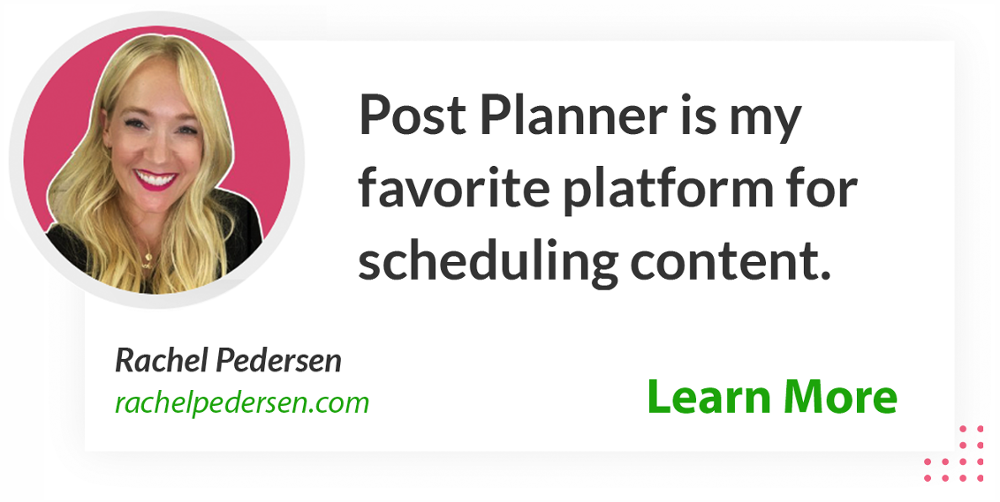[ad_1]
Want to grow your professional network via Facebook?
This article gives you 10 Facebook networking tips to grow your network and business via social media.
Question: How many Facebook networking groups do you belong to?
Please… don’t say “None”!
The sooner you start using Facebook Groups to network, the better off you and your business will be!
Facebook networking groups are some of the BEST places to build lasting professional relationships.
When people gather around a common interest — it creates incredible opportunities to share status updates, photos, and links.
More importantly, it creates opportunities to GROW your network and your business!
However, there’s a difference between understanding that Facebook networking is essential and knowing HOW to use Facebook groups for networking.
So how can Facebook be used for job networking?
10 Facebook Networking Tips to Grow Your Network (and Business)
In this article, we’re going to focus on the HOW of Facebook networking.
To do that, we’ll provide you with our top 10 Facebook networking tips that are sure to help you:
- Grow your network
- Take advantage of the relationships you form on Facebook
- Push more traffic to your website and more customers to your business
Sound good so far?
Read on to learn:

Why Facebook networking is so important
Before we can talk about the HOW, we need to talk about the WHY.
In other words, is it really even worth it?
Should you put in the effort it takes to create a professional network on Facebook?
YES, YES, YES!
Not only can your Facebook network help you grow your business, but there are even tools that can help you network better and faster than ever (we’ll cover those later!).
Let’s look at 4 reasons why Facebook networking is one of the MOST important things you can do for your career.
1. Facebook will help you maintain a valuable presence in your niche
First and foremost, Facebook networking can help you become a well-known voice in your niche.
But what does that mean?
- People start recognizing you as an authority in conversations surrounding your niche.
- People know what your business offers and how to get in touch with you.
- People start to develop relationships with you, which may eventually turn into business relationships and sales.
For example, let’s say you have a business in the landscaping industry that’s in Austin, TX.
If you regularly network with other landscapers, businesses, and potential clients, you will become more well-known in your area.
In addition, being present in those communities can draw clients to you over time.
2. Gain the ability to contribute to industry conversations (instead of your competitors!)
If you choose NOT to network on Facebook, what’s the worst that could happen?
You better believe that your competitors ARE networking on Facebook, and they’ll dominate conversations that you could have participated in.
That means:
- You lose out on potential sales.
- Your competitors become better recognized than you.
- You lose the respect of other industry leaders.
So how do you avoid those consequences?
Regularly contribute to conversations in your niche.
If you consistently contribute value to industry-related discussions, you can get ahead of your competitors.
In other words, networking isn’t just something extra that you should do if you have the time.
It can also be a critical part of beating your competitors and winning new clients!
3. Facebook has high volume potential
Facebook is HUGE.
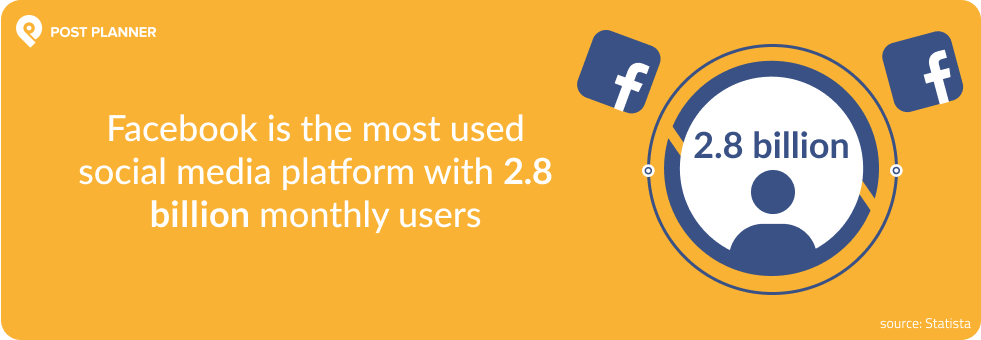
Facebook has more than 2.8 BILLION users. Yes, you read that right.
Where else are you going to have access to that kind of volume?
Not only are there TONS of people on Facebook, but most of them are primed and ready to find new businesses.
More people discover new businesses on Facebook than any other source (even more than Google Reviews!).
For networking, that means that you have access to a bigger platform with higher potential success rates than anywhere else!
Don’t throw that opportunity away by not using Facebook for networking!
4. High lead-to-close ratio
A lead-to-close ratio analyzes how many of the leads a platform generates will ultimately become paying customers.
Study after study confirms that social media has a higher lead-to-close ratio than almost any other platform.
That means that the effort it takes to grow your professional network on Facebook will be WELL rewarded.
In other words, every minute spent networking on Facebook is valuable for your business.
It has the potential to:
- Increase your brand recognition
- Lead to more professional relationships (which lead to more sales)
- Expose your business to new customers
- Generate new leads
Every lead you generate on Facebook (through networking or other strategies) has a high chance of becoming a paying customer.
10 Facebook networking tips that will grow your professional network
Now you know why networking on Facebook is so important, but how do you network on Facebook?
People usually spend about 145 minutes per day on social media.
Unfortunately, most of that time isn’t spent building stronger professional networks.
Instead, most people spend it aimlessly watching cat videos or taking a quiz to figure out which Hogwarts house they’d be in (I’m a Hufflepuff, btw).
If that’s how you spend your time on Facebook, don’t expect your network to grow magically.
For your business to benefit from Facebook, you have to spend time intentionally working on your BUSINESS network.
The remainder of this article will give you 10 solid ideas about how to spend your time on Facebook.
If you follow these tips, your network should reliably grow and produce more customers.
1. Find niche groups
The rest of these tips won’t be in order, but it’s CRUCIAL that you do this step first.
Finding a niche group on Facebook is the first step because it connects you with a community of people already interested in what you have to say.
For example, I looked up the keyword “fishing” in the Facebook search bar. Then, I filtered the results to show me Facebook groups.
I quickly found several groups that would allow me to connect with other people interested in fishing.
If I were running a business in the fishing niche, this would be a valuable opportunity to connect with other companies and potential clients.
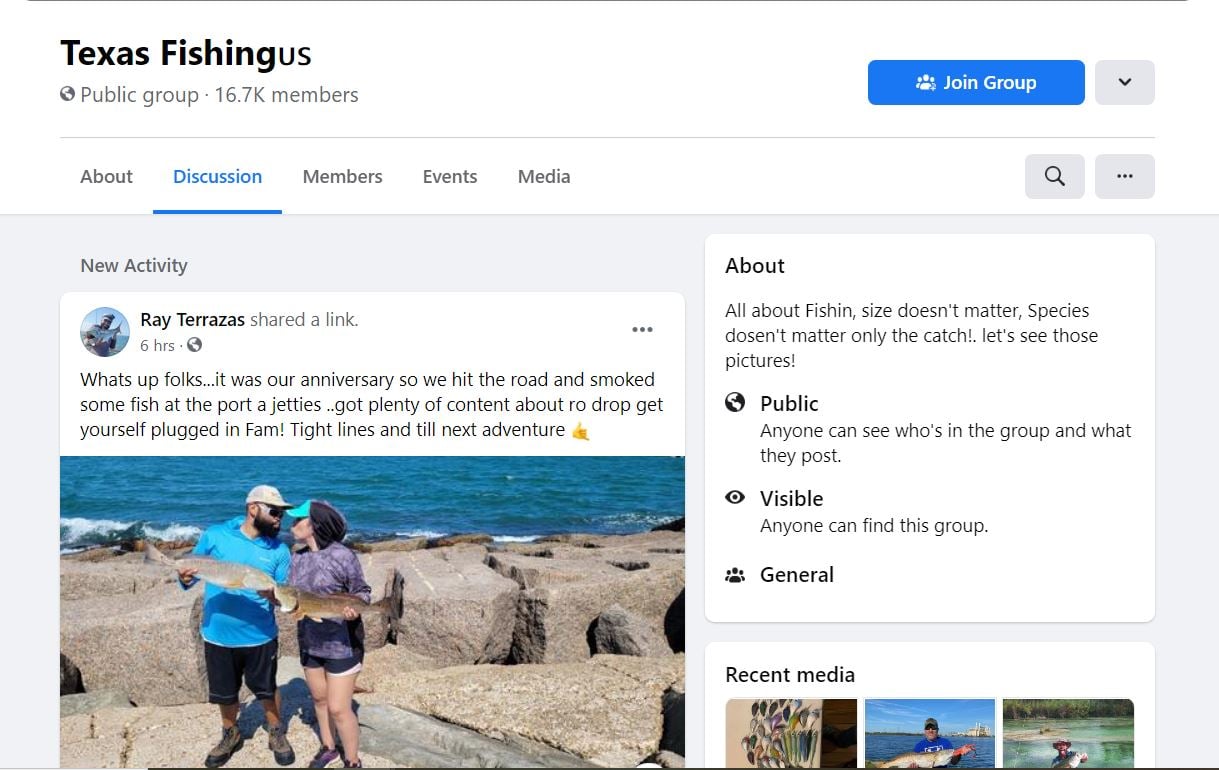 Interacting with the people in this group means that I’ll be able to connect with people that are ready to hear my message, which is why finding niche groups is the FIRST STEP that you need to take.
Interacting with the people in this group means that I’ll be able to connect with people that are ready to hear my message, which is why finding niche groups is the FIRST STEP that you need to take.
2. Learn from your Facebook groups
Many people join groups on Facebook because they want to learn something.
As a networker, there are 2 main things you should be focusing on learning:
- What are the interests, trends, likes, and dislikes of the members of your group?
- How could you use this audience data to improve your business?
First, you need to be learning exactly what appeals to the members of your niche community.
Networking is mostly about making yourself valuable to others (which we’ll discuss later), so use your groups to learn what’s helpful to people in your niche.
Second, you can learn how to improve your business from other posters. For example, you might learn:
- New ways to market yourself
- New trends or ideas that you could incorporate into your business
- New productivity habits
In the same group we mentioned above, there are plenty of posts made by people trying to learn more about their niche. Again, this helps people engage with you, and it enables you to provide more value later on.
 Learn as much as you can from your group. It’ll improve your networking and your business as a whole.
Learn as much as you can from your group. It’ll improve your networking and your business as a whole.
3. Cut out the spam!
You may choose to make your own group.
If you do, follow this word of caution:
Make sure to keep spammers out of your groups!
Delete spammy posts as quickly as possible & ban those who don’t follow the rules.
A group is no place for irrelevant, offensive spam! Plus, it makes you look bad if newcomers look at your group only to find hundreds of spam posts.
I’ve been a member of countless groups that started great, but ended up miserable because spam was out of control.
For example, it didn’t take me long to come across several spam posts while scrolling through the groups mentioned above.
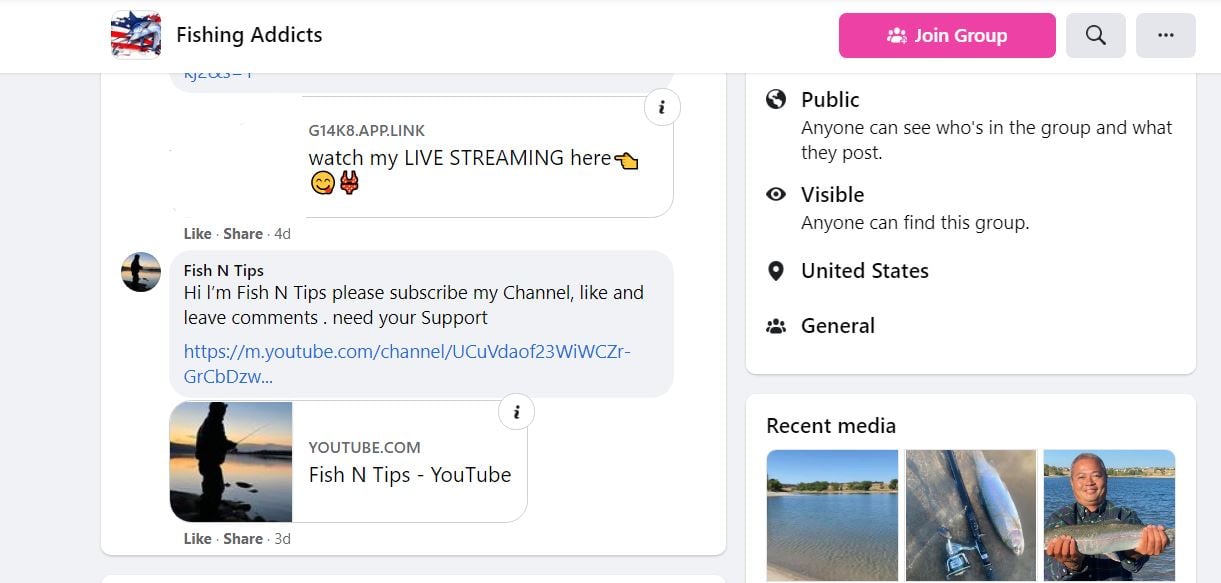 This type of spam reduces the group’s overall quality and makes it less likely that people will do real networking.
This type of spam reduces the group’s overall quality and makes it less likely that people will do real networking.
Do whatever you can to keep spammers away! The survival of your group may depend on it.
4. Offer support to group members
Providing customer service on Facebook can make your business look good.
One form of customer service you can provide in Facebook groups is always being ready to answer people’s questions.
So when someone has a question (even if it doesn’t directly relate to your business), help them out by ANSWERING it.
If you have an article on your website that can help them, drop them a link and quickly give them the main points in a comment.
You’ll educate everyone in the group when you respond to people’s questions.
For example, take a look at this question someone asked in a Facebook group:
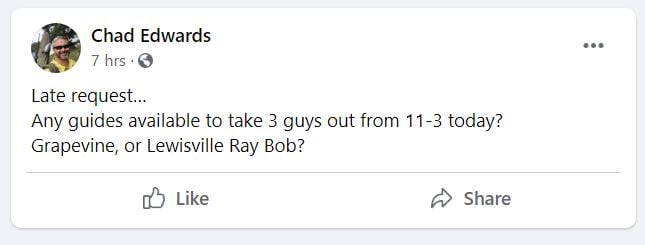 Even if you don’t offer the service they need, pointing them in the right direction makes you look good and strengthens your network.
Even if you don’t offer the service they need, pointing them in the right direction makes you look good and strengthens your network.
Facebook groups are also great places to spark conversations & get feedback on new products & services that you’re thinking about offering.
5. GENERATE more leads
With a Facebook group, you’ll be able to build your credibility by helping others.
If you create a reputation for being helpful, people will flock to your groups to benefit from your expertise.
Try to be the go-to group when someone looks for advice in your niche. This is a fantastic way to use Facebook for lead generation.
Generating leads on Facebook is a slow but reliable process. Just make sure that you are consistently providing value and being helpful. You will consistently see more:
- Followers
- Page visitors
- Sales
6. Build deeper relationships
One of the biggest mistakes business people make when networking on social media is not pursuing actual relationships with others.
Instead of investing in other people who may become clients, they try to turn everyone into a paying customer instantly. Unfortunately, this heavy-handed, “salesy” technique pushes people away instead of attracting them to your page.
Don’t focus only on turning everyone into sales. Instead, focus on forming relationships with people. The sales will naturally follow.
For example, people in this group regularly post pictures of the fish that they catch. Other people comment encouragement, congratulations, or questions below.
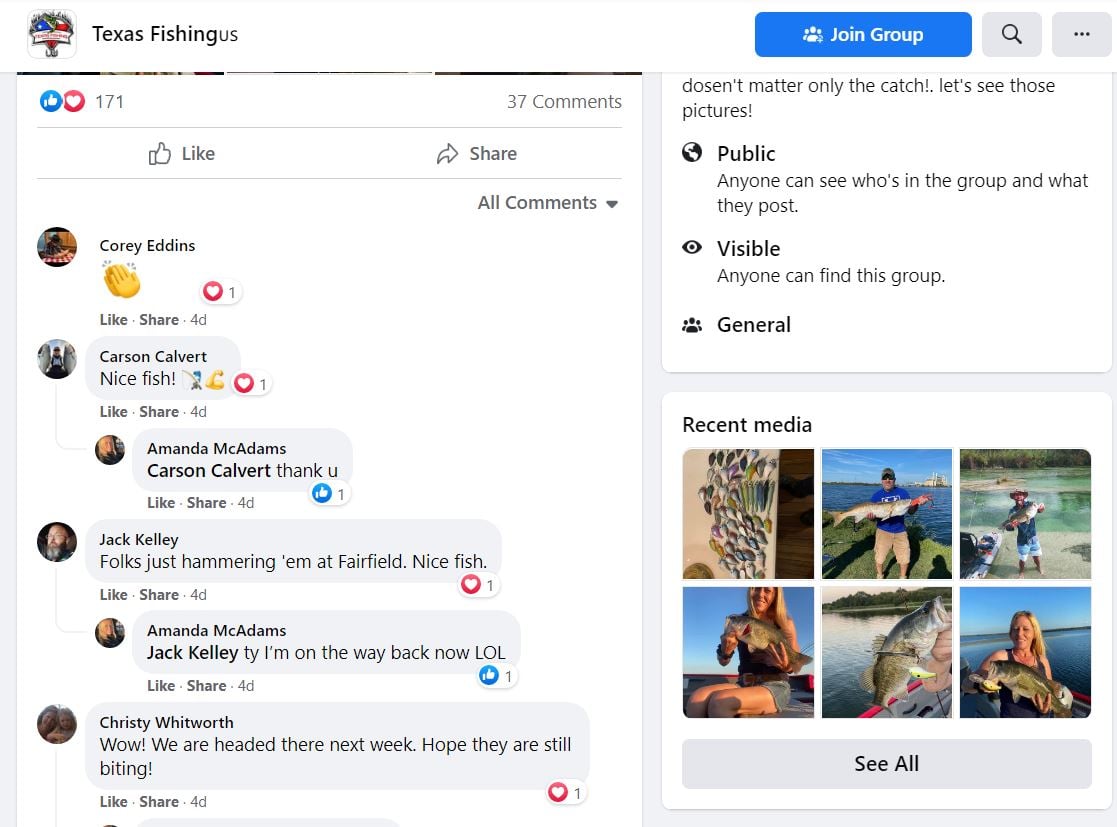 This camaraderie is a great way to form deeper relationships with people in your niche.
This camaraderie is a great way to form deeper relationships with people in your niche.
7. Participate in professional conversations
Another common feature of Facebook groups is the presence of conversations about professional topics.
Finding and participating in these professional conversations about your niche makes your business look more approachable and relevant.
If you run a coffee roastery, finding professional conversations about coffee roasting is an excellent way to:
- Spread your expertise
- Learn from others
- Find new people to connect with
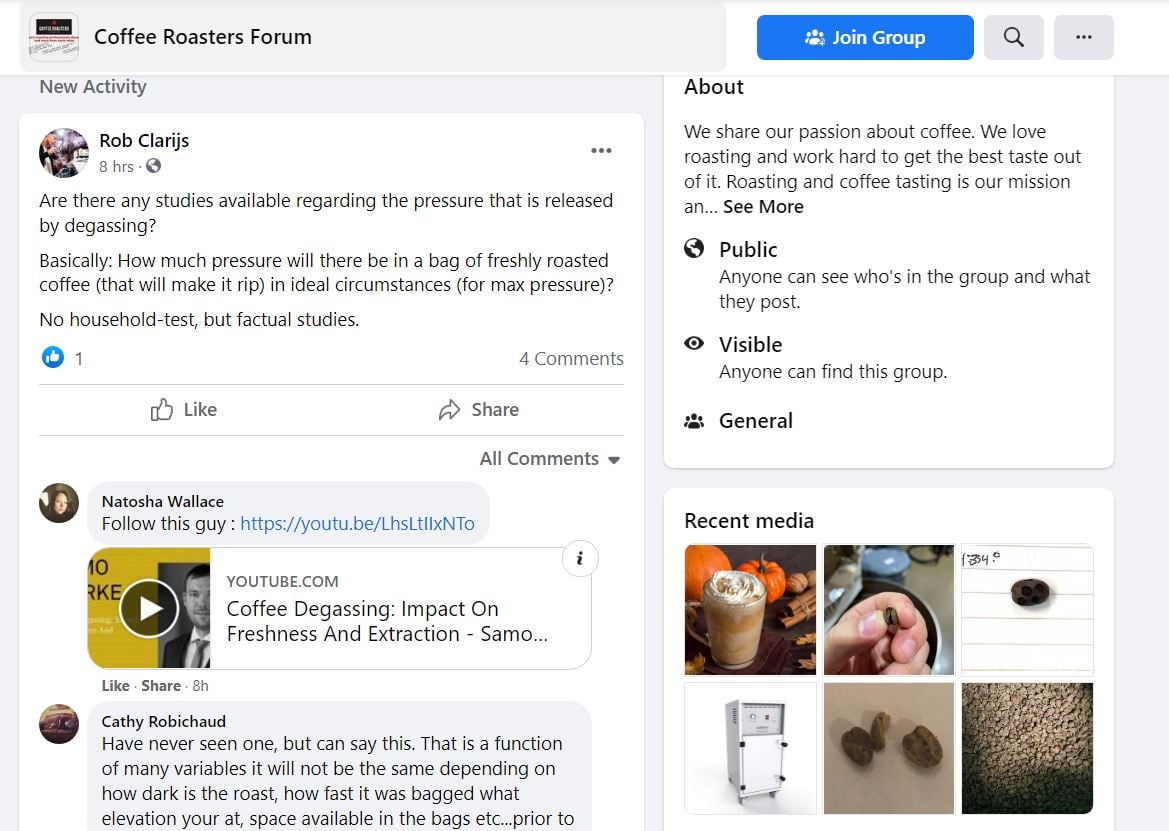
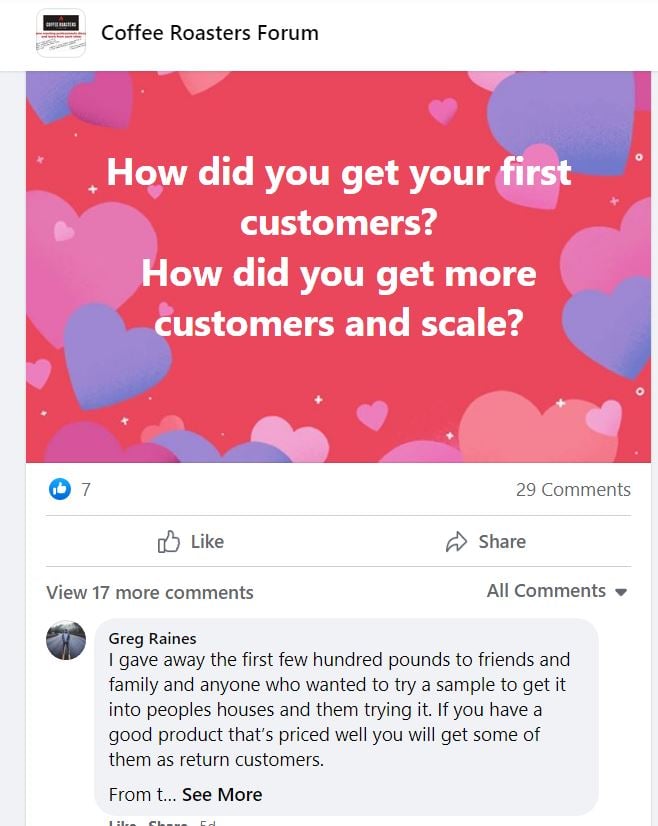 If you make a Facebook group in your niche, you should regularly post conversation starters that spark professional conversations like this one.
If you make a Facebook group in your niche, you should regularly post conversation starters that spark professional conversations like this one.
8. Post valuable content
If you find a group in your niche, what will determine whether you join it or not?
Probably your primary consideration will be the quality of the content.
That’s why you should make sure to post high-quality content that’ill benefit everyone in the group!
However, finding valuable content to post to these groups can be highly time-consuming. Using a tool like Post Planner to find content makes it easier and faster.
All you have to do is use Post Planner’s search tool to find pre-made content streams full of super relevant content in your niche.
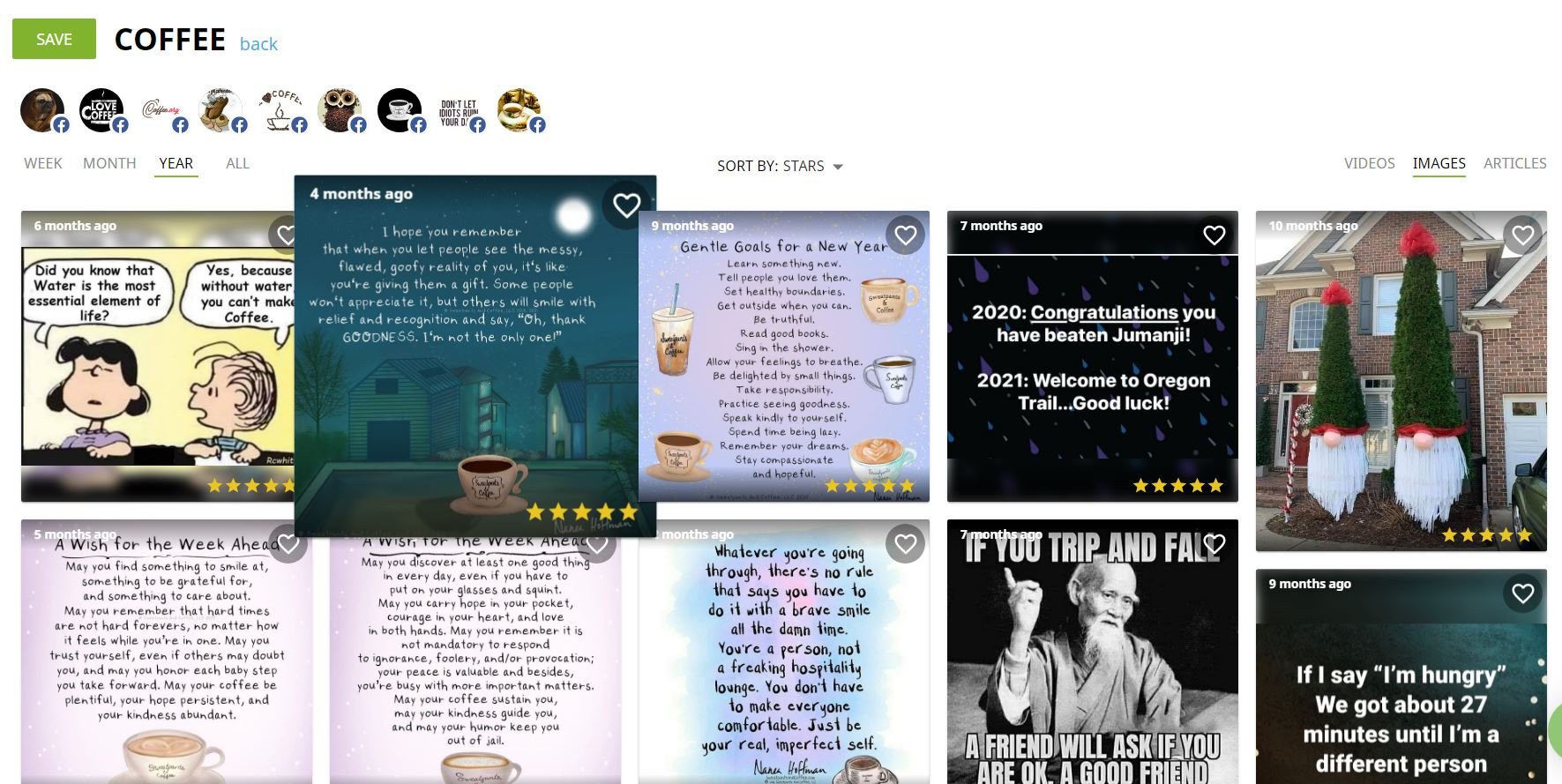 Finding hundreds of posts about coffee took me about 2 minutes using Post Planner’s search tool and pre-made content streams.
Finding hundreds of posts about coffee took me about 2 minutes using Post Planner’s search tool and pre-made content streams.
9. Take advantage of visual content
Visual content is one of the most critical parts of posting online.
- It draws viewers’ eyes to your posts.
- It increases engagement.
- People are more likely to read and share visual content.
Luckily, Post Planner makes it extremely easy to find and share visual content.
When you do your search, just filter the content by the type that you want to see. Post Planner can help you quickly find:
- Memes
- Images
- Videos
- Gifs
- Infographics
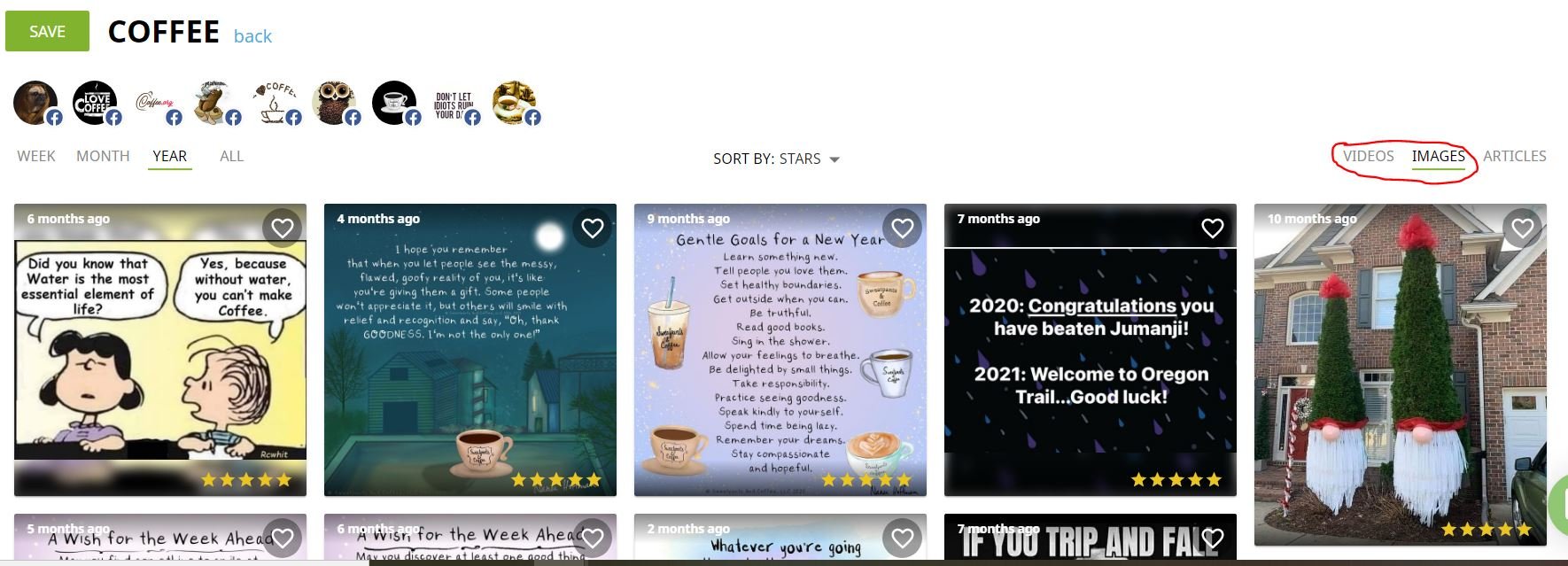 When you find something that provides excellent value to your Facebook networking groups, just share it with those groups.
When you find something that provides excellent value to your Facebook networking groups, just share it with those groups.
As a bonus, you can set up a posting schedule with Post Planner that’ll automatically post content to your profile.
So while you’re looking for content to share with your networking groups, just add content to your calendar. It’ll automatically post when scheduled!
10. Push traffic to your site
Finally, make sure that you take advantage of your networking groups to push viewers to your website!
One of the best ways to do this is by creating excellent content for your site and then sharing a link to it with your Facebook networking groups.
For example, this poster pushed viewers to his YouTube channel by sharing a link to his newest video with his Facebook networking group.
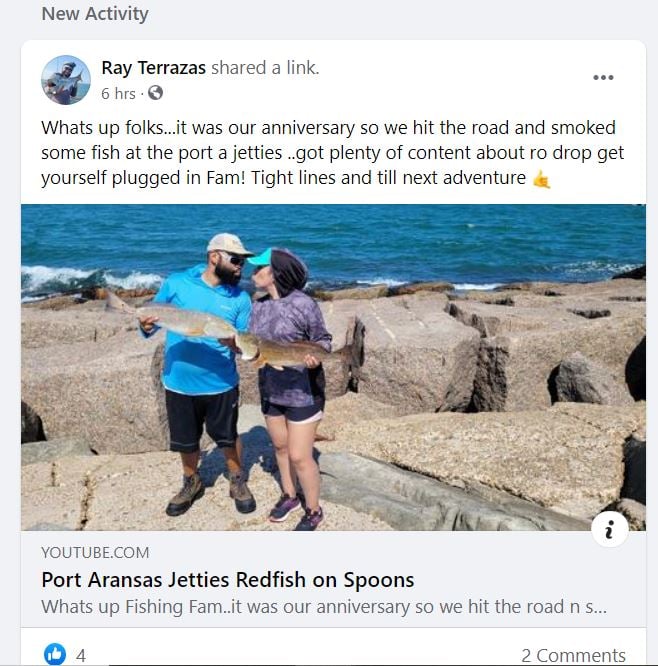 When you create an excellent post on your website, use Post Planner’s Canva integration to create a visual piece of content that you can share with your groups.
When you create an excellent post on your website, use Post Planner’s Canva integration to create a visual piece of content that you can share with your groups.
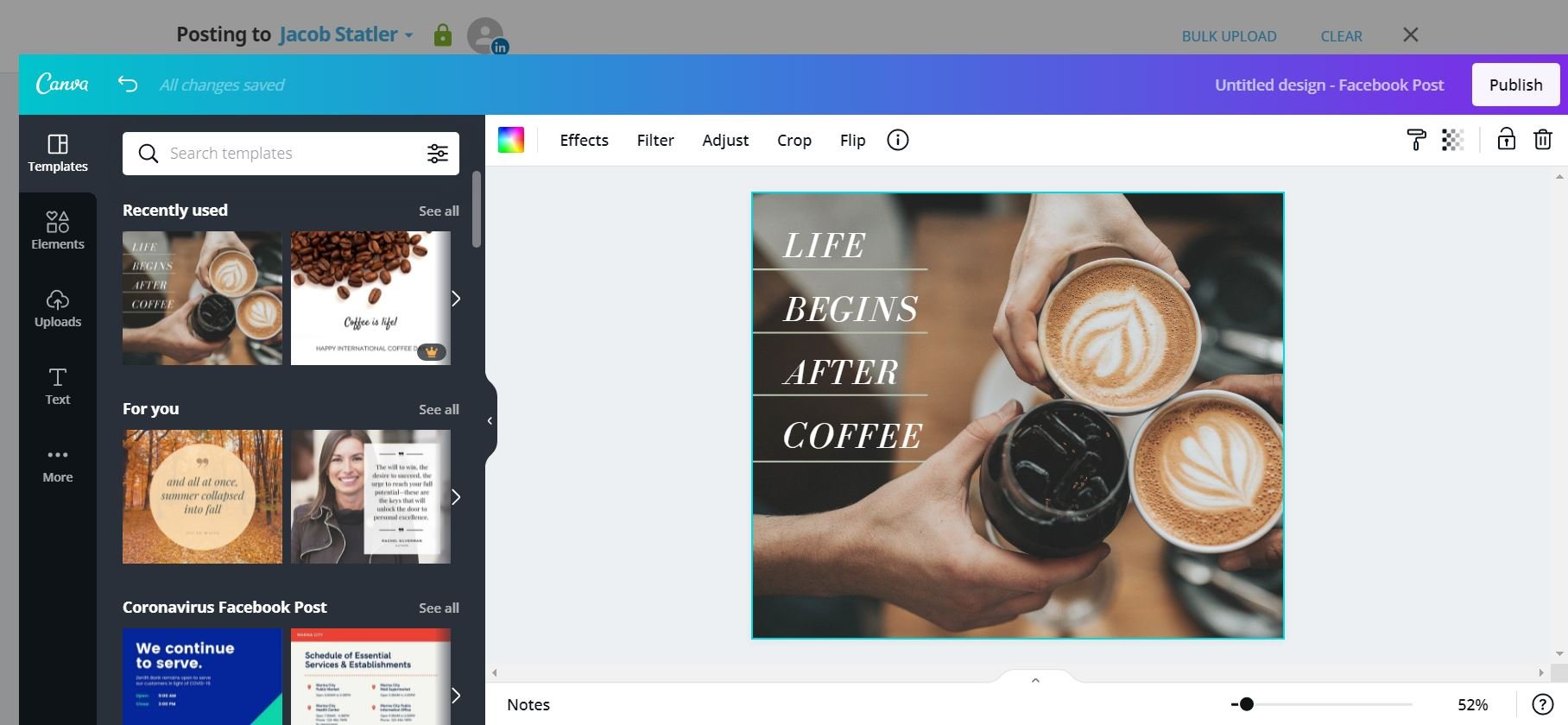 This final step will help you take advantage of your new Facebook network to increase pageviews and make sales!
This final step will help you take advantage of your new Facebook network to increase pageviews and make sales!
Your turn
Learning how to network on Facebook will help you grow your business and improve your professional connections.
The 10 simple tips I discussed in this post will ensure that you can network as effectively as possible.
Does your organization run a group on Facebook? Do you belong to any important Facebook groups?
If so, how do you use groups to attract customers, provide value, and build relationships?
Let us know in the comments below!
[ad_2]
Source link


